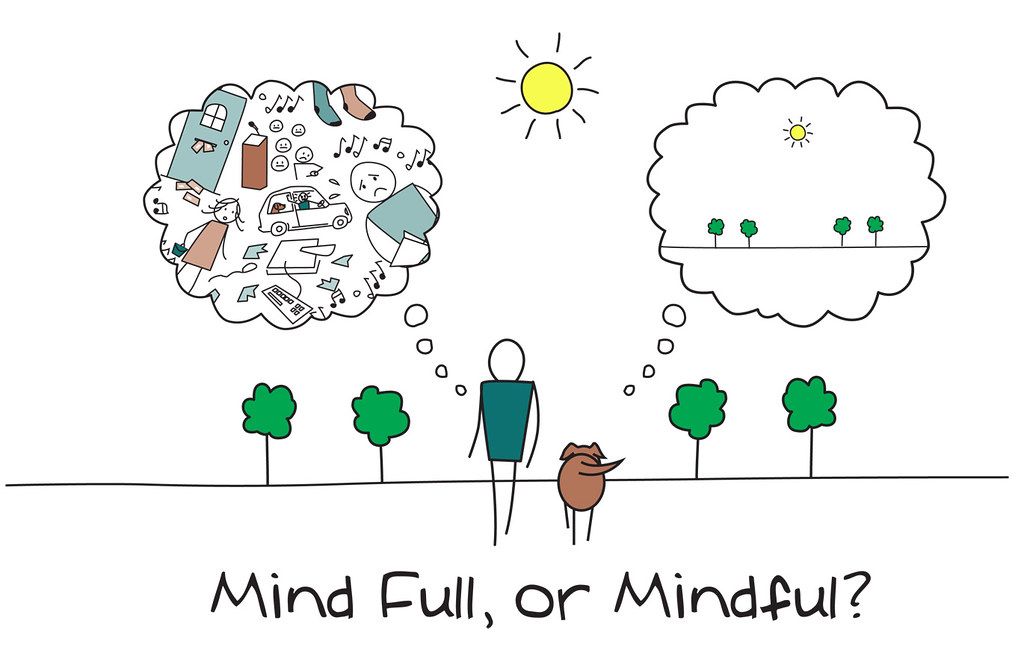Mindfulness
More and more people are becoming interested in mindfulness and how it can help them; it is even available on the NHS in some areas. Mindfulness helps people overcome anxiety, depression, addiction and more. Sessions are run 1-2-1, in small groups, in schools, in the workplace, in hospitals etc.
.
Example uses include
- MCBT (Mindfulness based Cognitive Behavioural Therapy)
- ACT (Acceptance Commitment Therapy)
- Mindful Meditation
So what is it and how does it work?
Mindfulness means ‘to be mindful’ or ‘being present in the here and now’. One of the reasons it is so powerful is that we all live in the future and past, most of the time, so worry about what might happen or has happened. Mindfulness brings you into the present and stops the distress.Be mindful not mind-full
 Many people stop at this point and use it as a kind of mental pause button. As nice as that can be, what happens when you release the pause button? Mindfulness is far more powerful than just a mental pause, it has the ability to retrain your mind and body and enable you to build personal resilience.
Many people stop at this point and use it as a kind of mental pause button. As nice as that can be, what happens when you release the pause button? Mindfulness is far more powerful than just a mental pause, it has the ability to retrain your mind and body and enable you to build personal resilience. When correctly taught, you will be able to use the mindful state of non-judgement that removes the emotional affects, and enables you to build more useful understanding and responses.
It is human design that when you learn things correctly, you learn them mindfully by paying conscious attention. Unfortunately it is also human design that we accidently learn things unconsciously and therefore have no control over its impact. This can be corrected through mindfulness training.
Mindfulness sessions will leave you relaxed and in control of your life.
Please contact us to discuss how we can help and how you can book your mindfulness sessions. Call 0121 251 6172 or email via the contact page
Mindfulness and ACT
Here is a little more information on how mindfulness is used in Acceptance and Commitment Therapy.
It tends to be more ‘bite-sized’ based on research that shows that even brief periods of regular mindfulness practice (5- 10 mins or just mini mindful moments!) can still be beneficial and help us to ‘rewire’ our brain.
It tends to be more ‘bite-sized’ based on research that shows that even brief periods of regular mindfulness practice (5- 10 mins or just mini mindful moments!) can still be beneficial and help us to ‘rewire’ our brain.
While many people think mindfulness means meditation, this is not the case. Mindfulness is a mental state of openness, awareness and focus, and meditation is just one way among hundreds of learning to cultivate this state. - Russ Harris
Acceptance and Commitment Therapy gets its name from its main themes - to accept things that are out of your control and commit to changing things that can be changed to make your life better. In summary, ACT uses mindfulness and acceptance skills to develop a more flexible relationship with your thoughts, feelings, memories and sensations. Time is also taken to clarify what gives your life meaning, your values. Without being held back by tricky thoughts and feelings and with a new sense of purpose and direction, you can begin to build a more enriched and meaningful life.
The objective of ACT is not elimination of difficult feelings; rather, it is to be present with what life brings us and to "move toward valued behaviour“.
- To develop emotional /psychological resilience and flexibility through mindful practice.
- Mindfulness is awareness - primary thinking, not judgement thinking – secondary thinking.
- It is an attitude of openness and curiosity (non-judgement).
- It is a process of learning.
- It is the art of living consciously.
ACT six core principles for psychological flexibility
- Acceptance: Allowing unwanted private experiences (thoughts, feelings and urges) to come and go without struggling with them.
- Cognitive defusion: Learning methods to reduce the tendency to reify thoughts, images, emotions, and memories.
- Being present: Awareness of the here and now, experienced with openness, interest, and receptiveness. (mindfulness)
- The observing self: Accessing a transcendent sense of self, a continuity of consciousness which is unchanging.
- Values: Discovering what is most important to oneself.
- Committed action: Setting goals according to values and carrying them out responsibly, in the service of a meaningful life.
Call us to discuss and book your first session on 0121 251 6172